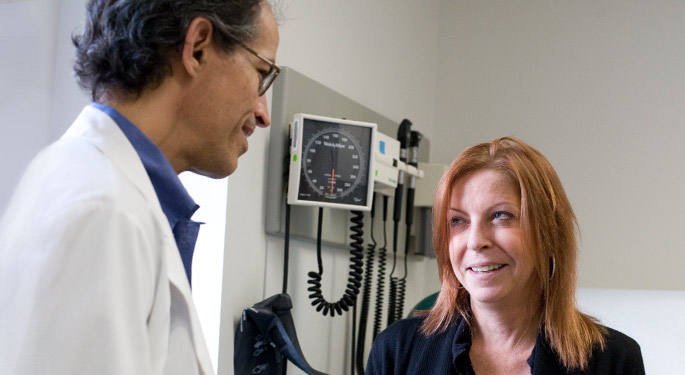Center of Excellence for Liver and Bile Duct Cancer
If you or a loved one has liver or bile duct cancer, you want the best possible care. There’s a place you can go for everything from diagnosis to follow-up care. The Mount Sinai Center of Excellence for Liver and Bile Duct Cancer is here for you. We have long led the way in treating and studying liver and bile duct cancer. And we offer compassionate care that focuses on your needs and those of your family. We are part of The Tisch Cancer Institute at Mount Sinai, a National Cancer Institute-designated Cancer Center. Each year, we see more than 400 new patients who have cancer that started in the liver. This makes ours the biggest center in the United States.
Our Team Approach
Our experts work as a team to provide seamless care. Led by Myron Schwartz, MD, the Henry Kaufmann Professor of Surgery and Director of Liver Surgery in the Recanati-Miller Transplantation Institute, we have specialists from a variety of disciplines. Our specialists include:
- Hepatobiliary surgeons
- Hepatologists/gastroenterologists
- Medical oncologists
- Palliative care professionals
- Pathologists
- Radiation oncologists
- Radiology specialists
- Transplant surgeons
We also provide you with emotional support. Our Cancer Support Services team provides counseling, practical help, patient education, and wellness programs. We are here for you.
Conditions We Treat
At the Center of Excellence for Liver and Bile Duct Cancer, we treat many conditions. These include:
- Benign liver tumors such as hemangioma, adenoma, focal nodular hyperplasia, and cysts
- Bile duct cancer (cholangiocarcinoma)
- Gallbladder cancer
- Metastatic liver tumors
- Primary liver cancer (hepatocellular carcinoma)

Treatments We Offer
We use state-of-the-art treatments. Our advanced treatments include:
- Surgical procedures
- Hepatic resection: Removing part of the liver
- Liver transplantation: Replacing the diseased liver with a healthy one from a human donor
- Hepatic artery infusion pump implantation: Pumping chemotherapy directly into the liver
- Image-guided therapy
- Chemoradiation: Combining chemotherapy with radiation therapy
- Proton therapy: Sending a beam of proton particles to the tumor
- Stereotactic body radiation therapy: Directing high doses of radiation to the tumor
- Thermal ablation: Using microwave currents to heat the tumor until it is dead
- Transarterial therapy (killing the tumor by blocking its blood supply)
- Chemoembolization: Injecting particles containing chemotherapy to block the blood vessel feeding the cancer
- Radioembolization with yttrium-90: Injecting radioactive material into the blood vessel feeding the tumor
- Systemic treatment (throughout the body)
- Chemotherapy: Using drugs to treat cancer
- Immunotherapy: Giving drugs that help the immune system recognize and destroy cancer cells
- Molecular-targeted therapy: Using medications that treat the specific abnormalities that caused the cancer
- Management of underlying liver disease and its complications
- Novel treatment for fatty liver disease and nonalcoholic steatohepatitis
- Screening and monitoring for liver cancer
- Treatment of viral hepatitis
Excellence in Research
Mount Sinai is at the forefront of liver cancer research. Our research has led to many treatment advances that help improve treatments. We also offer many clinical trials. These often provide the most advanced and effective therapies available.

